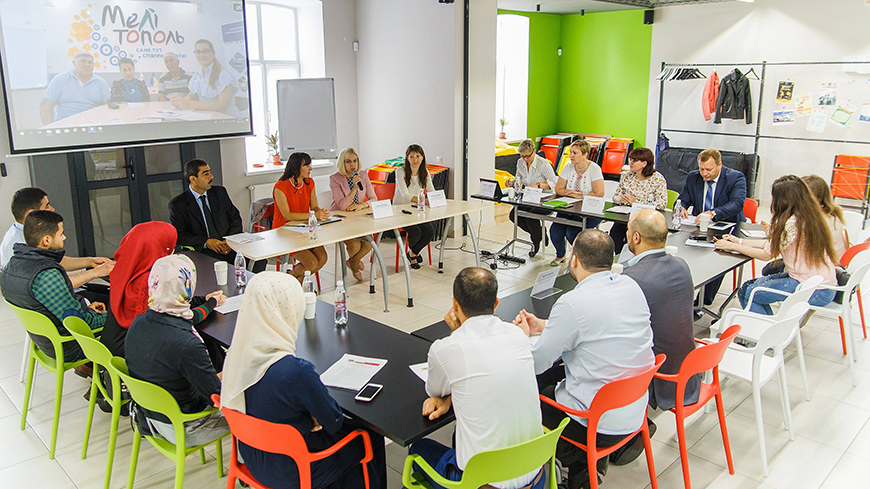On 8 June 2018 the city of Vynnytsia organised a Round Table on the issue of inter-confessional relations with the aim to: 1) to raise awareness on the challenges faced by Muslim communities in Vynnytsia and more widely in Ukraine; 2) strengthen the intercultural dialogue dimension of the city’s policy; 3) further encourage the representatives of national minorities to interact and actively participate in the city's socio-economic and cultural life thus preventing any religion based discrimination; and 4) to establish a closer connection between the city administrators, minority representatives and civil society organizations in order to promote and support positive intercultural coexistence. The city invited other members of the Ukrainian network of Intercultural Cities to join the Round Table.
Participants were representatives of the Vynnytsia City Council and the Regional Administration, the Islamic Culture Centers of both Kyiv and Vynnytsia, the NGO "Al-Isra", representatives of the City Council of Pavlograd, the Coalition for Combating Discrimination in Ukraine, the Information and Education Center "VIS", the Vinnytsia based Human Rights Organization "Source of Hope, and representatives of the Muslim communities of Vinnytsia and Melitopol.
The discussion focused on the integration of the Muslim community in Vynnytsia, in Ukraine and Europe in general. The participants covered the issues of anti-Muslim prejudice and stereotyping and the dangers of radicalization as a consequence of exclusion and marginalization; they further considered the best practices from other ICC cities on how to counterbalance religious and ethnic intolerance. Discussions were supported by a review of the relevant international legislative instruments and regulations that ensure the protection of human and minority rights, such as the Framework Convention for the Protection of National Minorities of the Council of Europe.
Tarik Sarhan, from the Islamic Culture Center Kyiv, spoke positively about the presented opportunity to freely live, work and practice his religion in Ukraine and emphasized the importance of preserving Muslim cultural and religious heritage. Imam Musa Salim, Vynnytsia, highlighted the importance of the intercultural events jointly organized by Vynnytsia Muslim Center and the local authorities, as these initiatives “allow us to meet more often and better understand each other… We discovered so many similarities in our cultures as the Orthodox (dominant religion in Ukraine) and Muslims have been interacting for centuries, historically influencing each other’s cuisine, culture, languages, designs and traditions...”.
The representative of the Regional Administration, Mr Igor Sikorskij presented the most recent minority statistics in Vynnytsia region and outlined the strategy of the recently established regional Center for Minorities.
Participants agreed that, although the context of Muslim communities’ integration differs in Ukrainian and Western European cities, the intercultural integration model can be effectively applied to interfaith relations as well as to urban policies design in order to build harmonious communities free from stereotypes. In practical terms, this implies creating the opportunities for local community members to meet and interact, jointly and positively address their arising issues, discuss possible conflict with the view of managing it and identify common solutions, while assuring the atmosphere of understanding, open-mindedness and mutual respect. To make this happen on in Vynnytsia, it was decided to establish a closer official cooperation between the local NGO “Al-Isra”, which works with Muslim communities in Vynnytsia, and Vynnytsia municipal and regional authorities, as part of the city’s intercultural strategy.
During the Round Table, the city of Vynnytsia further announced its decision to be one of the pilot cities to test the Intercultural Citizenship Test, one of the most recent ICC initiatives that seeks to assess citizens’ knowledge and awareness of human rights, their intercultural competences, their perception of diversity, as well as their willingness to act in an intercultural way.




